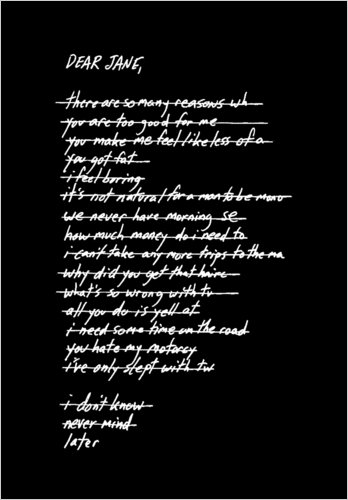Way back in June my friend Abby Kinchy let me know about an article in the New York Times by Stephanie Coontz, a scholar best known for her book The Way We Never Were, which addresses myths about the “traditional” family. The article is about no-fault divorces and their pros and cons. What struck Abby were the accompanying images, which depict two hypothetical break-up letters (to “John” and “Jane”) that include a list of stereotypes about men and women, what they want out of marriage, and why they fight.
The Dear John letter:
So women want to break up because they feel stunted in their marriage (they miss out on experiences, they’re bored, they want to travel), they are still hung up on old flames, they want kids and their male partners (of course) don’t, and they just might be lesbians.
The Dear Jane letter:
What do men stereotypically want to leave their female partners for? Being emasculated (“you make me feel like less of a…”), men aren’t supposed to be monogamous (“it’s not natural for a man to be mono…”), they want more sex with more people, women spent too much money shopping, or their wives get stupid haircuts.
There is some gender agreement, though; neither men nor women can take a spouse who gets fat.
UPDATE: Citizenparables thinks the images are more playing on those still-existing stereotypes:
Perhaps the point of the images is rejecting – crossing out – those cliche stereotypical excuses, which are by implication false (because surely they can’t all be true!), leaving the essential idea that when someone leaves a relationship it’s a choice, pure and simple, which they ought to own rather than blame on either themselves or the partner.



Comments 23
Citizenparables — July 21, 2010
Perhaps the point of the images is rejecting - crossing out - those cliche stereotypical excuses, which are by implication false (because surely they can't all be true!), leaving the essential idea that when someone leaves a relationship it's a choice, pure and simple, which they ought to own rather than
blame on either themselves or the partner.
ptp — July 21, 2010
There are also several self-effacing reasons such as "you are too good for me". It's kind of disappointing when you cherry-pick stuff out of your own content, because you sometimes seem, to me, to miss the bigger picture. Yes, there are stereotypes in here. Are they avoidable? What is the context for this list? What does it say that some of these are self-effacing and some are accusatory? I think those are much more interesting question than whatever it is you're trying to answer, and they're still very relevant to this blog.
Ronald Thompson — July 21, 2010
I suppose there could be somethign said about the fact of men and women both not wanting to be with someone that doesn't get fat. I suppose there are people that are incredibly surfaced and are unable to look beyond certain aspects. Then again, I do believe we should all try to remain attractive for our partner in any regard, including weight.
jennifer — July 21, 2010
this is more about the original op/ed piece than today's posting, but as i am going to trial for a no-fault divorce in the morning, i felt like commenting...
going through a no fault divorce in wisconsin has been quite the experience. i have been horribly treated by my husband and in some ways it would be very satisfying to have my day in court - a chance to wag my finger for the abuse and indignities i have faced as his spouse. so i asked a local legislator why wisconsin adopted such a policy and was told the following:
the intention in wisconsin adopting a no-fault policy was to eliminate the "he-said/she-said" aspect of divorce trial and to make it easier for abused spouses (usually women) to escape marriages.
i think both the op/ed piece and the art work gloss over this very real aspect of divorce. sometimes the choice to leave a marriage is self preservation. at least in wisconsin, this may have been the driving force behind adopting no fault.
Ertuğrul — July 22, 2010
The interesting thing about these letters relying on gender steoreotypes is that, while some of them are very culturally originated, more than half of the issues mentioned in each letter perfectly match the relationships in other parts of the world, including Turkey, of which I am a citizen.
And the reason to end a relationship is the same here, too. It is, most of the time, a combination of various small or big issues, but essentially, just the will to end. By the way, I think that attraction and affinity play a much bigger role than daily problems, and that's the area in which couples around the world are the most similar.
Hans Bakker — July 22, 2010
Divorce laws are quite different from state to state in the United States. Marriage and divorce laws are different in Canada's provinces, too. Recently there has been a lot of news about Massachusetts marriage laws. When a husband and wife divorce then it is often the case that one of them has to pay alimony, for life! There is a movement afoot now to make the laws more reasonable, in terms of changed circumstances. If the former wife is making a lot more than the former husband it does not seem entirely fair for the husband to be paying large alimony payments twenty years after the divorce, often payments which the "live in girl friend" (as they call it) has to help pay! With the idea of same sex marriage the divorces are going to get even more interesting in Massachusetts, and other states. The idea of a no-fault divorce may have some value, but like all legislative changes there will be some people who suffer or fall between the cracks (e.g. women who should have received alimony). In Quebec the divorce laws are very interesting because they made a 180 degree change and the result has been a drastic reduction in the percentage of people who get married at all.
Greg D. — July 22, 2010
The Washington Post Magazine just had a cover story on marriage as a skill rather than has a match made in heaven. The point being that marriage is not so much about who the two people (with all the bagage of gender based expectation) are but how they manage differences and conflict. Link to the WAPO article: http://www.washingtonpost.com/wp-dyn/content/article/2010/06/18/AR2010061804509.html
I think it's mostly true but I still believe there can be some irreconcilable differences between people but I guess that's why dating/courting is about: make sure there is enough in common to start with.
On a side note, the marriage law debate is interesting. One one hand I believe in individual freedom but on the other hand if (when) divorce was harder or socially less acceptable people would make (were making) more effort to try to make it work.
Sadie — July 23, 2010
I find it interesting that the "Dear John" letter doesn't say anything about abuse. A lot of women leave their husbands for the plain and simple fact that the man is verbally, psychologically or physically abusive to them or their children. "You need to get help" and "I refuse to be treated like this" or "I won't let that happen ever again" should be on that list. Then again, I'm not sure I would bother writing a letter to someone who was abusing me or my kids. Likewise, I think many men leave relationships due to abuse too. The fact that these very real, very legitimate reasons for ending a marriage seems strange to me.
Kerry Smith — July 25, 2021
In my opinion, marriage is a very responsible decision. Many people in old age remain lonely for various reasons. It could be a divorce or something else. Therefore, it will be useful for such people to study additional info about a good dating site for seniors, thanks to which they will again be able to experience a wonderful feeling of love.